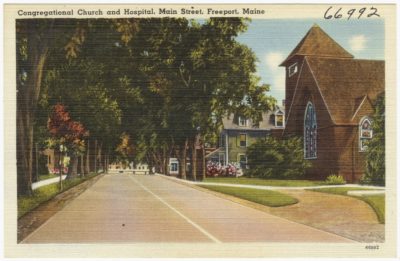Editor's Note
With an eye on Boston and #USIH2020, today’s guest post is by David Mislin, author of Saving Faith: Making Religious Pluralism an American Value at the Dawn of the Secular Age and Washington Gladden’s Church: The Minister Who Made Modern American Protestantism. His current project examines religious liberalism and progressive politics in small-town America in the twentieth century. He teaches in the Intellectual Heritage Program at Temple University.
 Looking ahead to a conference in Boston on the theme of “reform,” I’ve been reminded that in one key area of my work, the emergence of the Protestant ecumenical movement in the early twentieth century, Boston was not at the forefront of reform and innovation.
Looking ahead to a conference in Boston on the theme of “reform,” I’ve been reminded that in one key area of my work, the emergence of the Protestant ecumenical movement in the early twentieth century, Boston was not at the forefront of reform and innovation.
As David Hollinger and others have observed, ecumenism was one of the defining features – if not the defining feature – of American liberal Protestantism. [1] In most historical treatments, ecumenical commitments emerged amid the growing popularity of liberal theology within American Protestantism, championed by church leaders and theologians who recognized the benefits promised by cooperating on social issues at home and avoiding denominational conflict in mission fields abroad.
By the close of the nineteenth century, Boston was home to a number of luminaries of liberal Protestantism, including Borden Parker Bowne at Boston University and George A. Gordon at Old South Church. But when it came to the outward manifestations of ecumenism, the city’s Protestants were late adopters of ideals first put into practice in smaller New England towns hundreds of miles to the north.
In the early 1890s, representatives of six Protestant denominations in Maine formed the state’s Interdenominational Commission. Its goal was straightforward: “to promote co-operation in the organization and maintenance of churches in Maine.” [2] The group included representatives of the Baptist, Christian (Disciples of Christ), Congregationalist, Free Baptist, and Methodist denominations, who coordinated statewide efforts to prevent the establishment of more churches than a community could support. They urged congregations to combine Sunday Schools, hold joint worship services, or in some cases to federate or merge into a single church.

Alfred Williams Anthony, Free Baptist clergyman, one of the early leaders of the Maine Interdenominational Commission
The members of the commission framed their efforts as a vehicle for advancing the cause of Social Christianity. “People who work together, rather than those who debate together, become united. A common ministry in social service produces a united church,” wrote Alfred Williams Anthony, one of the group’s organizers. [3] In small-town Maine, cooperative effort was hailed as the antidote to religious apathy. In 1898, the Congregationalist minister of Freeport lamented “It needs hardly be said that the state of religious life in the church is not what it should be: the social services have not been as heartily supported as they ought, and the lack of accessions does not evince a high vitality in the spiritual work of the church.” Over the next decade, his church joined with local Baptists and Universalists for combined worship and service projects that “resulted in much good to the churches.” [4]
Notably, these efforts in small communities in Maine predated comparable endeavors in larger cities. New York City established its first federation of churches in 1895, five years after Maine had a statewide ecumenical body. Massachusetts did not have a similar organization until 1902. Participants in the 1905 Inter-Church Conference on Federation invoked Maine’s Interdenominational Commission as a model for what would become the Federal Council of the Churches of Christ in America. [5]
Much of the scholarship on Protestant liberalism during the late nineteenth and early twentieth centuries rightly posits large cities as the primary sites of religious innovation. As Heath Carter is among the most recent of scholars to show, Social Christianity was inseparably linked with mass industrialization and rise of the modern city. [6] The divinity schools and large churches that were the intellectual hubs of liberal Protestantism were also in or near major urban centers like Boston, New York, and Chicago.
But the lesson of Maine in the 1890s is that not all innovations in liberal religious thought and practice began in major cities, and there are broader implications in that fact. The larger history of U.S. religious ideas in the twentieth century is often presented as a story of cultural and regional division: major metropolitan areas became more progressive, while residents of rural areas grew disenchanted with liberal religious values and the mainline denominations that increasingly espoused those values.
My research on my current project suggests, however, that the experience of small-town Maine at the end of the nineteenth century anticipated what was to come in the decades that followed. Throughout the twentieth century, religious liberals in small communities were often at the forefront of campaigns for progressive values. Ecumenical groups in small towns developed outreach programs for migrant laborers, demanded greater funding for social services, and urged the importance of accessible healthcare.
This is not to discount the importance of cities in the development of twentieth-century liberal Protestantism, but rather to suggest that the ideas promoted in cities often reflected the practical experience of church communities in smaller towns.
[1] David A. Hollinger, After Cloven Tongues of Fire: Protestant Liberalism in Modern American History (Princeton: Princeton University Press, 2013), xiii.
[2] Circular of Information: The Interdenominational Commission of Maine (Lewiston, ME: The Commission, 1913), 4.
[3] Alfred Williams Anthony, “The New Interdenominationalism,” American Journal of Theology 20 (October 1916): 499.
[4] Entries for December 28, 1898, and May 3, 1908, Records of First Congregational Church of Freeport, Maine, 1887-1948, Series I, the Congregational Library and Archives (Boston, MA).
[5] Anthony, “The New Interdenominationalism,” 496.
[6] Heath Carter, Union Made: Working People and the Rise of Social Christianity in Chicago (New York: Oxford University Press, 2015).

0